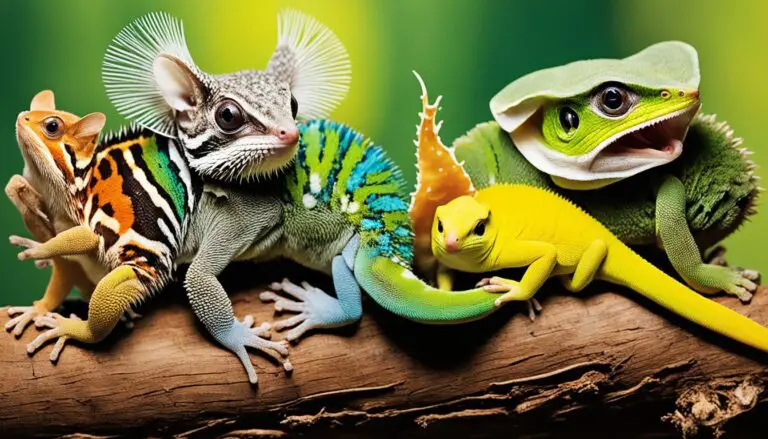Exotic Pet Care Costs: Insights and Guidelines
Owning an exotic pet can be a rewarding experience, but it’s important to understand the costs involved. From daily care and nutrition to veterinary expenses, there are several factors to consider when budgeting for exotic pet care. In this article, we’ll provide insights and guidelines to help you manage the costs of caring for an exotic pet.
Key Takeaways:
- Understanding the costs of caring for an exotic pet is essential before bringing one home.
- Consider the daily care, nutrition, and veterinary expenses when budgeting for exotic pet care.
- Research local and state laws to ensure owning an exotic pet is legal in your area.
- Evaluate your housing situation and provide the appropriate habitat for your pet.
- Factor in the nutritional needs and required veterinary care for your exotic pet.
Best Exotic Pets to Consider
If you’re looking for a unique and exciting pet, small exotic mammals, also known as pocket pets, can be a fantastic choice. These adorable creatures not only provide companionship but also have unique characteristics that make them stand out. From playful pigs to cuddly hamsters, there are various options to suit different lifestyles and preferences.
One popular choice in the category of small exotic mammals is the pocket pig. These miniature pigs not only have an irresistible charm but also form strong bonds with their owners. With proper care and training, pocket pigs can become loving and affectionate companions.
Hedgehogs are another popular choice for those seeking a small exotic pet. With their cute quills and curious nature, hedgehogs can bring joy to any household. In addition to being relatively low-maintenance, hedgehogs have unique behaviors that make them fascinating to observe.
For those who prefer a smaller and more manageable pet, hamsters are an excellent option. These tiny creatures are known for their adorable appearances and entertaining antics. With proper handling and care, hamsters can become beloved members of the family.
Mice, ferrets, chinchillas, gerbils, rats, and rabbits are also among the best exotic pets to consider. Each of these small mammals has its own unique qualities and requirements, making them suitable for different individuals and households.
Choosing the Right Exotic Pet
When considering an exotic pet, it’s important to research each species thoroughly to ensure it aligns with your lifestyle, living situation, and personal preferences. Some pets may require more space, specialized diets, or specific environmental conditions. By understanding the needs and characteristics of these small exotic mammals, you can make an informed decision and provide the best possible care.
Remember, owning an exotic pet is a long-term commitment, and it’s essential to be prepared for the responsibilities and care they require.
| Exotic Pet | Description |
|---|---|
| Pocket Pig | Miniature pigs that form strong bonds with their owners |
| Hedgehog | Cute and curious creatures with unique behaviors |
| Hamster | Tiny and entertaining pets, suitable for small spaces |
| Mice | Small and sociable mammals that thrive in groups |
| Ferret | Playful and energetic pets with a mischievous nature |
| Chinchilla | Soft and gentle creatures known for their luxurious fur |
| Gerbil | Active and social pets that enjoy interactive play |
| Rat | Smart and trainable pets that form strong bonds with their owners |
| Rabbit | Docile and sociable pets that can be litter trained |
By considering the needs and characteristics of each small exotic mammal, you can choose the best pet for your lifestyle and provide a loving and enriching environment for your new companion.
Factors to Consider Before Getting an Exotic Pet
Before deciding to bring an exotic pet into your life, it’s crucial to consider several factors to ensure you can provide the best care for your new companion. From legalities to housing, nutrition, veterinary care, and time commitment, taking these aspects into account will help you make an informed decision that aligns with both your lifestyle and the well-being of the animal.
Legalities
First and foremost, familiarize yourself with the laws and regulations surrounding exotic pet ownership in your area. Different states and municipalities may have specific restrictions or require permits for certain species. Conduct thorough research to ensure that owning the exotic pet you desire is legally permissible.
Housing
Creating a suitable and safe environment for your exotic pet is vital. Take into consideration the specific habitat requirements of the species you’re interested in. Ensure that you can provide ample space, appropriate temperature and humidity levels, and any necessary equipment or enclosures. The well-being of your pet depends on their ability to thrive in their habitat.
Nutrition
Understanding the dietary needs of your exotic pet is crucial for their overall health and longevity. Research the specific nutritional requirements of the species you’re considering, as these can vary significantly between different animals. Providing a balanced and well-rounded diet is essential to meet their unique nutritional needs.
Veterinary Care
Just like any other pet, exotic animals require regular veterinary care to ensure their well-being. However, finding a veterinarian with expertise in exotic pets may be more challenging. Research local veterinary clinics that specialize in exotic pet care and ensure they offer the necessary services, such as check-ups, vaccinations, and emergency care.
Time Commitment
Exotic pets often require a significant time commitment for their care and maintenance. Consider your daily schedule and lifestyle to ensure you have enough time to dedicate to your pet’s needs. This can include feeding, cleaning, socialization, and providing enrichment activities. Taking the time commitment into account will help ensure a happy and healthy relationship with your exotic pet.
By carefully considering these factors before bringing an exotic pet into your life, you can ensure that you’re prepared to provide the necessary care, attention, and resources for the well-being of your new companion. Remember, exotic pets can be unique and rewarding companions, but responsible ownership is essential.
Understanding Exotic Pet Insurance
Exotic pet insurance provides a safety net for unexpected medical expenses that may arise when caring for exotic animals. This type of insurance coverage extends to a variety of unique pets, including reptiles, birds, rodents, and small mammals. By familiarizing yourself with the details of exotic pet insurance, such as the cost, coverage, benefits, reimbursement process, and exclusions, you can make an informed decision about whether it is the right choice for you and your beloved exotic pet.
One of the primary concerns when considering exotic pet insurance is the cost. Similar to traditional pet insurance, the cost of exotic pet insurance can vary depending on factors such as the type of animal, its age, and the chosen coverage plan. It is crucial to thoroughly research different insurance providers and compare their pricing, taking into account the level of coverage provided.
When selecting an exotic pet insurance plan, it is essential to understand the coverage it offers. Exotic pet insurance typically covers a range of medical expenses, including veterinary visits, diagnostic tests, medications, and even surgery. However, it is vital to review the terms and conditions carefully, as each insurance plan may have specific limitations and exclusions.
By opting for exotic pet insurance, you can enjoy a variety of benefits. Firstly, it offers peace of mind, knowing that your pet’s medical expenses will be covered in unforeseen circumstances. This can alleviate financial stress and allow you to focus solely on providing the best care for your exotic pet. Furthermore, having insurance coverage may enable you to seek prompt veterinary attention without concerns about the cost, potentially improving the outcome of your pet’s medical condition.
Reimbursement is a critical aspect of exotic pet insurance. Depending on the insurance provider and plan, reimbursement can be based on a percentage of the total eligible expenses or a predetermined benefit schedule. Carefully review the reimbursement process and any required documentation to ensure a smooth claims experience.
It is important to note that there may be exclusions and limitations when it comes to exotic pet insurance. Common exclusions include pre-existing conditions, elective procedures, breeding-related expenses, and behavioral training. It is vital to thoroughly understand these exclusions and inquire about any potential limitations before enrolling in a specific insurance plan.
In conclusion, exotic pet insurance can provide valuable financial coverage for unexpected medical expenses related to the care of your exotic pets. Understanding the cost, coverage, benefits, reimbursement process, and exclusions associated with exotic pet insurance is essential to make an informed decision. By weighing the benefits against the cost and considering the unique needs of your exotic pet, you can determine whether exotic pet insurance is the right choice for you.
Tips for Budgeting and Managing Exotic Pet Care Costs
Budgeting and managing exotic pet care costs is crucial to ensure that your pet receives the necessary care without straining your finances. By implementing cost-saving measures and making informed choices, you can provide quality care for your exotic pet while keeping expenses in check.
Preventive Care: Investing in preventive care can help you avoid costly veterinary bills down the line. Schedule regular check-ups and vaccinations for your exotic pet to maintain their health and catch any potential issues early on. This can save you money in emergency medical expenses later.
DIY Grooming: Consider grooming your exotic pet at home. By learning basic grooming techniques and investing in the necessary tools, you can save money on professional grooming services. Additionally, regular grooming sessions contribute to your pet’s overall well-being.
Proper Nutrition: Providing your exotic pet with a well-balanced and appropriate diet is essential for their health. Research the dietary needs of your pet species and explore affordable nutrition options. By sourcing affordable yet nutritious food, you can manage your pet’s care costs without compromising their well-being.
Cost-Saving Tips: Explore different ways to save on pet supplies and services. Look for discounts, promotions, and bulk purchasing options. Additionally, consider alternative but reliable brands that offer quality products at a lower cost. These small adjustments can make a significant difference in managing your exotic pet care budget.
Tip: Research online communities and forums dedicated to exotic pet owners. These platforms are a great source of advice and insights on budgeting for exotic pet care. Engaging with other pet owners can provide you with additional tips and tricks for managing your pet’s expenses.
Remember, providing proper care for your exotic pet doesn’t have to break the bank. By incorporating preventive care, DIY grooming, and cost-saving measures into your budgeting plan, you can ensure that your pet receives the care they need while managing your expenses effectively.

Finding Affordable Exotic Pet Veterinary Services
Finding affordable exotic pet veterinary services is essential for managing the overall cost of care. When it comes to caring for your unique pet, it’s important to find local veterinarians who specialize in exotic pet care and understand their specific needs.
Many local veterinarians offer affordable services for exotic pets. By doing some research and asking for recommendations from other exotic pet owners in your area, you can find veterinary clinics that provide high-quality care at reasonable prices.
Cost of Veterinary Care
The cost of veterinary care for exotic pets can vary depending on the type of animal, the services required, and the location. It’s essential to consider these factors and budget accordingly for routine veterinary visits and any potential emergencies.
Remember, preventive care is key to keeping veterinary costs manageable. Regular check-ups, vaccinations, and health screenings can help catch any potential health issues early on, preventing more costly treatments later.
Importance of Preventive Care
Preventive care plays a crucial role in keeping your exotic pet healthy and minimizing veterinary expenses. Regular check-ups, vaccinations, and diagnostic tests can help identify and address potential health concerns before they become more serious and costly to treat.
Proper nutrition and dental care are also important aspects of preventive care for exotic pets. Ensuring your pet’s diet is well-balanced and providing regular dental cleanings can help prevent certain health issues that could require costly interventions.
Managing Emergency Care Expenses
Emergency situations can arise unexpectedly, and it’s important to be prepared for them financially. Consider setting aside an emergency fund specifically for your pet’s care, which can help cover unexpected veterinary expenses without causing financial strain.
Additionally, some veterinary clinics offer payment plans or financing options for emergency care. It’s worth discussing these options with your veterinarian to determine if they can help make emergency care more affordable.
By finding affordable exotic pet veterinary services, prioritizing preventive care, and planning ahead for emergency situations, you can effectively manage the cost of caring for your exotic pet while ensuring their health and well-being.
Environmental Considerations and Exotic Pet Ownership
When considering exotic pet ownership, it is crucial to be aware of the environmental impact it may have. The pet trade, which fuels the demand for exotic pets, can negatively affect wild populations and contribute to ecological disruption. Additionally, some exotic pets have the potential to become invasive species, posing a threat to local ecosystems.
The pet trade involves the capture and transportation of animals from their natural habitats to supply the demand for unique and exotic pets. This practice can have devastating consequences, leading to the decline of wild populations and disrupting delicate ecosystems. It is essential to understand that the exotic pet trade should be approached with caution and responsible practices should be encouraged.
“The exotic pet trade poses a significant threat to biodiversity and the delicate balance of ecosystems. It is important that individuals educate themselves about the potential consequences and make informed decisions when choosing an exotic pet.”
Invasive species are another concern associated with exotic pet ownership. When exotic pets are released or escape into the wild, they can establish breeding populations and outcompete native species, disrupting the natural balance of ecosystems. Invasive species can have devastating effects on biodiversity and even cause economic damage.
As a responsible pet owner, it is essential to make informed decisions about pet acquisition and adhere to regulations that promote the well-being of both the pet and the environment. Researching the exotic pet you are interested in and understanding its ecological implications is of utmost importance.

Image: The image depicts a diverse range of animals, showcasing the variety of exotic pets that are sought after.
Responsible Pet Ownership for Environmental Conservation
Being environmentally conscious while owning an exotic pet involves choosing pets that are not obtained through illegal or unsustainable means. Prioritizing rescue, adoption, or purchasing from reputable breeders who follow ethical practices can help reduce the harm caused by the pet trade.
In addition, responsible pet ownership also includes proper containment and care for exotic pets to prevent them from escaping and causing potential harm as invasive species. Pet owners should be aware of the specific needs and behaviors of their exotic pets to ensure they are kept in a safe and secure environment.
Conclusion
Owning an exotic pet can bring a lot of joy and unique experiences into your life. However, it’s crucial to carefully consider the costs involved and make informed decisions to ensure you can provide the care your pet deserves. By implementing effective budgeting strategies and researching affordable care options, you can manage your exotic pet care costs without compromising their well-being.
Financial planning plays a significant role in exotic pet ownership. Create a budget specifically for your pet’s needs, including expenses such as food, vet visits, and necessary supplies. By planning ahead, you can better anticipate and manage your expenses, ensuring the financial stability of your pet’s care.
Moreover, it’s essential to explore cost-saving alternatives. Look for affordable veterinary services that specialize in exotic pet care. Investigate preventive care measures, such as regular check-ups and vaccinations, to avoid unexpected expenses down the line. Additionally, consider adopting DIY grooming practices and sourcing reasonably priced nutrition options to lower your pet care costs.
Remember, your exotic pet’s health and well-being should always be the top priority. While managing expenses is important, never compromise their care for the sake of saving money. With careful consideration, responsible financial planning, and a commitment to affordable care, you can provide a happy and healthy life for your exotic pet.
Source Links
- https://www.midwayvetlovesmypet.com/site/blog/2022/12/21/exotic-pets
- https://www.myshortlister.com/insights/questions-to-ask-before-purchasing-exotic-pet-insurance
- https://www.fool.com/the-ascent/insurance/pet/articles/3-reasons-you-need-pet-insurance-for-your-exotic-pet-too/
Peter Stones is the founder of Exotic Pets Place, the leading online resource for exotic pet care information.
With over 10 years of hands-on exotic pet ownership experience, he is deeply passionate about sharing his expertise to help others properly care for their unusual pets.
When he's not writing extensively researched articles or connecting with fellow exotic pet enthusiasts worldwide, you can find Peter at home tending to his own beloved menagerie of exotic animals.







